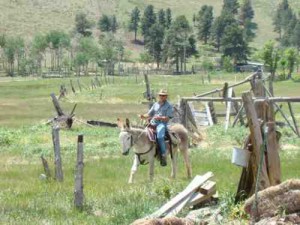Brief by Allen Best
Economy – January 2009 – Colorado Central Magazine
Telluride expects a hard winter, with real estate development and sales shuddering to a near stop and tourism as encouraging as dyspepsia.
Bookings are down 25 percent from last winter, a stellar season. The more apt comparison, says The Telluride Watch, is the 10 to 12 percent drop of the longer-term average.
The bleak prospects have some lodges cutting rates, 10 percent at one lodge and another willing to discount by 30 percent. Such discounts do seem to be having some effect, says Scott McQuade, chief executive officer of the Telluride Tourism Board. “When people do call, it’s much easier to close the deals and get them to come here,” he said.
In common with other ski areas, Telluride has allocated extra money to advertising its charms to Phoenix, Santa Fé, and Albuquerque, cities within a day’s drive or less.
The real-estate market, which has become the dominant economic driver since the early 1990s, is a tougher nut to crack. Real estate sales were down 51 percent for the year through October as measured by dollar volume.
Possibly more severe is the drop in construction. “Nobody is walking in the door for a construction loan,” said Tim Cannon, president of the Bank of Telluride.
Bankers tell the newspaper that they have tightened their lending criteria. So far, however, none has foreclosed on any properties. Andrew Karow, president of the local Alpine Bank, said he’s optimistic that the ski resorts of Colorado’s Western Slope will be more resilient than other areas. “We’ll experience far fewer foreclosures than Denver, Las Vegas or Phoenix.”
But conditions may worsen. “We will get to the point, maybe a year out, when a lot of projects are underwater,” said Tricia Maxon, president of Community Bank. “It’s happening in other places, where the value of the property is less than the amount of the loan. Will that happen here? I think that’s probable.”
Already, many in the real-estate trades are scouting other jobs, but there’s not much available. The lesson here, says Seth Cagin, publisher of The Watch, is that the aphorism about high-end resort towns being recession proof has been proven wrong.


